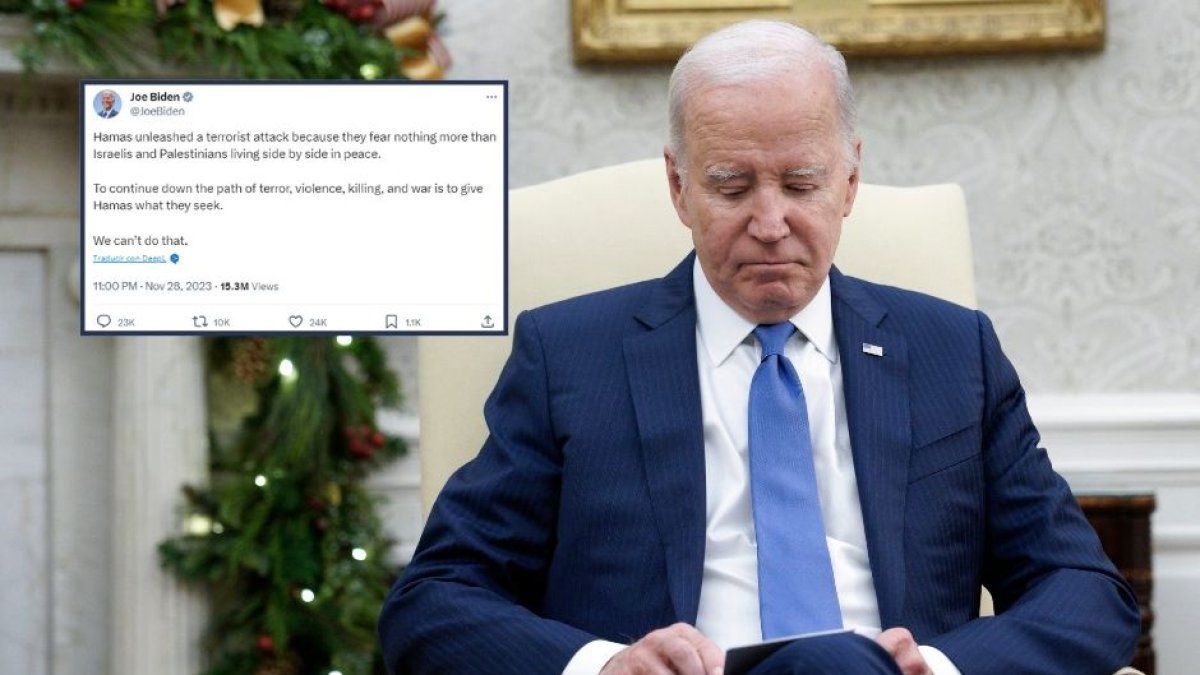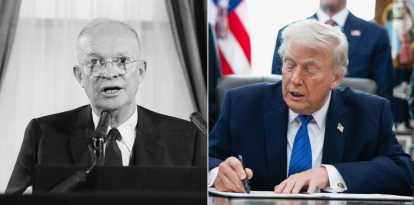Who’s winning the Biden administration’s civil war over Israel?
A controversial presidential post on X highlighted the White House’s attempts to simultaneously support Israel and signal its opposition to continue the fighting.

(Cordon Press / X)
This isn’t supposed to be the president with the social-media problem. For four years, President Donald Trump bypassed the press by tweeting his thoughts to more than 87 million followers on what used to be called Twitter. Trump’s feed was must-reading for anyone who followed politics or just wanted a good show as he shared his unfiltered thoughts about just about anything. The chattering classes hated it, considering it unpresidential and crude. But Trump’s willingness to be outrageous or to go for his opponent’s jugulars only endeared him to his supporters.
Social-media chaos at the White House was supposed to be a thing of the past once President Joe Biden took the oath of office. Biden has his problems, many of which revolve around his apparent physical decline as he heads deeper into his 80s. But unfiltered or ill-considered posts on X (as Twitter is now called) aren’t supposed to be one of them.
Yet a post on X published on Biden’s personal account (@JoeBiden), as opposed to the official presidential one (@POTUS), at 5 p.m. on Nov. 28 had the potential to turn the Middle East upside down. It read: "Hamas unleashed a terrorist attack because they fear nothing more than Israelis and Palestinians living side by side in peace. To continue down the path of terror, violence, killing, and war is to give Hamas what they seek. We can’t do that."
The next day, an anonymous "senior Biden administration official" pooh-poohed the idea that it was a policy shift, and noted that it was taken from a longer statement issued days earlier and shouldn’t be taken out of context. Yet that was exactly what the unknown White House staffer who posted it on Biden’s account—unlike Trump, who did most of his own tweeting, no one thinks the current president is typing out such posts on his phone—had done. We don’t know whether he did it under orders or on his own, but the impact of the post was not inconsiderable.
What did the post really mean?
Many among the president’s 37.6 million followers read that and not unreasonably concluded that he was taking a page out of Trump’s book, announcing a policy change on social media rather than through normal channels. Posted on a day when the future of the current ceasefire in Israel’s war with Hamas was in doubt, it seemed to be declaring the White House’s support for its indefinite continuation.
That was cause for grief and consternation among supporters of Israel. Jerusalem was forced to accept a halt in its Gaza offensive in order to secure the freedom of some of the hostages Hamas took during its Oct. 7 attacks. But if Biden was now saying that he opposed the continuation of the war, then that would not just contradict the president’s repeated pledges of support for Israel’s effort to eliminate Hamas. It would mean the Islamist group that committed unspeakable atrocities six weeks ago—and whose purpose is the destruction of the Jewish state and the genocide of its people—would be allowed to get away with mass murder.
By contrast, the considerable segment of the Democratic Party that opposes Israel and wants an immediate and complete ceasefire was thrilled. The push to save the terrorists in Gaza with a ceasefire has blurred the line between those who openly support Hamas and scream the "from the river to the sea" chant about Israel’s destruction, and those merely unsympathetic to Israel and/or concerned about the Palestinian Arabs who have been killed as a result of the war launched on Oct. 7. Either way, the revolt inside the Democratic Party and among the staffers at the White House, the State Department and other government agencies is at the point where it is potentially endangering the president’s re-election chances.
As a series of articles in The New York Times—the latest of which was published the morning the controversial X post was published—have made clear, Biden’s support for Israel is deeply unpopular among the younger generation of Democrats. That’s especially true for those who are working for the government and are likely to constitute the next generation of Democratic members of Congress, diplomats and government officials. These disgruntled staffers are backed up by the anger among the intersectional left wing of the party that produces most of the activists who work to elect Democrats. On top of that, groups such as the Council on American-Islamic Relations (CAIR) that support Hamas against Israel and speak for the Muslim-American community, are also venting their anger at Biden.
With polls showing Biden currently trailing Trump—his likely GOP opponent in the RealClearPolitics average of polls of the 2024 presidential race—the generational divide among Democrats about Israel is causing Biden real problems. Younger voters who have been subjected to critical race theory and intersectionality indoctrination in colleges oppose Israel far more than older ones. The loss of their enthusiasm, as well as the possibility that Arab voters who helped put Biden over the top in Michigan in 2020 might stay home or vote for a third-party candidate, puts the Democrats in peril.
That’s the real context of the Biden post on X. Whether the president intended it or not, it reflected the way that the administration’s pro-Israel stand has been crumbling under pressure from its supporters. The liberal corporate media that normally acts as his bodyguard against criticism is pushing hard to persuade him to listen to young anti-Israel Democrats—and abandon his support for the war against Hamas and force Israel to accept defeat.
The pressure on Israel to continue the ceasefire from Washington as Hamas shamelessly barters the hostages in an inhuman fashion is growing. Though the administration insists that it still wants Hamas defeated, it is also declaring that it opposes any real effort to clear the terrorists out of southern Gaza as Israel has begun to do so in the northern part of the Strip. Biden declared last week that he considers left-wing proposals for conditional military aid to Israel "a worthwhile thought," though not one he is presently willing to implement. Still, Israeli Prime Minister Benjamin Netanyahu understands that is an open threat to cut off the resupply of his military and effectively end the war whenever Biden decides the pressure from his intra-party critics is too much to bear.
Biden has justly received credit from the pro-Israel community for his stalwart statements of heartfelt support for Israel since Oct. 7, as well as for the revulsion that he and other administration spokesmen have expressed for Hamas’s goals and its crimes. But it’s far from clear how long he can continue balancing the desire of centrist Democrats like himself to stick with Israel against the increasingly unhinged accusations of "genocide" being hurled at Israel by the activist wing of the party and fueled by biased media coverage of the war.
White House meetings such as those described in the Times show he is bending over backwards in private to signal to the anti-Israel crowd that he is really on their side while reaffirming his support for the Jewish state in public.
Two states advocacy won’t help Biden
The administration is trying to use its support for a two-state solution at the end of the war, whenever that happens, as the exit ramp from its current predicament. That the Oct. 7 atrocities—launched from territory that was an independent Palestinian state in all but name ruled by Hamas—demonstrated exactly why the overwhelming majority of Israelis will never consider giving up security control of Gaza, or Judea and Samaria, for the foreseeable future.
It was no small irony that Biden’s latest gesture of support for a Palestinian state occurred this week on the 76th anniversary of the 1947 U.N. partition resolution. That measure divided the British Mandate for Palestine into three parts: an Arab state and a Jewish state with Jerusalem under international control. The Jews accepted the plan, but Palestinian Arabs—supported by the surrounding states—rejected it, declaring that they would never countenance the existence of a Jewish state in the ancient Jewish homeland under any circumstances. They launched a war to ensure that the newborn State of Israel would be crushed. But they failed utterly with hundreds of thousands of Arabs becoming refugees and an even larger number of Jews forced out of their homes in the Muslim and Arab world.
The United Nations commemorates the anniversary of the partition plan vote with an International Day of Solidarity with the Palestinian People, thereby repudiating their own effort to create a two-state solution. And Palestinians—whether supporters of Hamas or the supposedly more moderate Palestinian Authority that autonomously rules the Arab population in the West Bank—continue to reject two states if it means ending their long, futile war to destroy Israel.
Biden is wasting his time talking about two states, and not just because the Palestinians have repeatedly demonstrated that they will never agree to such a deal. What he won’t acknowledge is that the push for a ceasefire is not motivated by a desire for peace but implicit support for Hamas’s right to "resist" Israel and thereby pursue its destruction.
Biden has sought to appease the left by forcing the entire government to adopt the woke diversity, equity and inclusion (DEI) catechism that grants a permission slip to antisemitism by labeling Israel and Jews as "white" oppressors of "people of color." But he fails to understand that the forces he was mollifying believe Israel to be an illegitimate state and oppose peace. And the more he tries to navigate between their antipathy for Israel and his own desire to oppose Hamas, the more he will undermine Israel’s efforts to defend itself.
The Democrats’ political dilemma as the country moves deeper into the 2024 election cycle is real. The idea that Biden can convince both sides in the civil war going on among Democrats over Israel that he is with them is not a game that can continue indefinitely. Oct. 7 was an event that forced an administration trying to appease Hamas’s sponsor, Iran, and equivocal about its support for Israel into a laudable position of moral clarity. If it steps away from it, that will hurt, not help, him.
Contrary to the judgment of those in the White House who think that Biden can be all things to all people on the war in Gaza, the balancing act won’t win over the anti-Israel progressives while stymying his chances with the pro-Israel independents he needs to defeat Trump. This two-faced strategy hurts Israel. But the more Biden moves away from his principled stand behind the Jewish state and its just war to eliminate Hamas or pretends he is doing so, the worse it will be for his re-election chances.

























